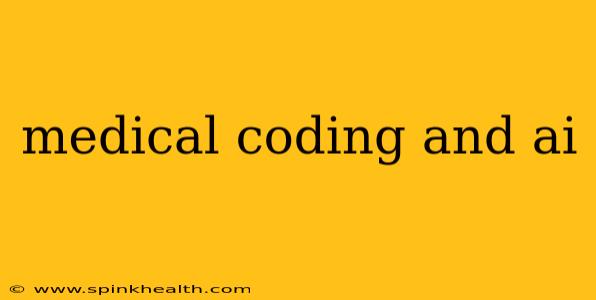The world of healthcare is undergoing a dramatic transformation, and at the heart of this change is the burgeoning field of artificial intelligence (AI). One area particularly impacted is medical coding, a critical process that ensures accurate billing and reimbursement for medical services. For years, medical coders have meticulously reviewed patient charts, identifying diagnoses and procedures to assign the correct codes. But now, AI is poised to revolutionize this intricate and often time-consuming task, offering increased accuracy, efficiency, and cost savings. Let's delve into this exciting intersection of medical coding and AI.
How is AI Changing Medical Coding?
Imagine a world where tedious manual coding tasks are automated, freeing up medical coders to focus on more complex and nuanced cases. That's the promise of AI in medical coding. AI-powered tools leverage machine learning algorithms to analyze patient data, including medical records, lab results, and imaging reports, to automatically assign the appropriate ICD (International Classification of Diseases) and CPT (Current Procedural Terminology) codes.
This isn't simply about speeding up the process. AI's ability to analyze vast amounts of data allows it to identify patterns and inconsistencies that might be missed by human coders, leading to significantly improved accuracy. This accuracy translates directly into better revenue cycle management and reduced denials from insurance companies.
What are the Benefits of Using AI in Medical Coding?
The benefits are multifaceted and substantial:
- Increased Accuracy: AI algorithms can identify subtle nuances in patient data and apply the most precise codes, reducing errors and improving the overall quality of coding.
- Improved Efficiency: Automation reduces the time spent on manual coding, allowing coders to handle a larger volume of cases and focus on more complex situations requiring human expertise.
- Reduced Costs: By improving accuracy and efficiency, AI contributes significantly to cost savings by minimizing denials and improving revenue cycle management.
- Enhanced Compliance: AI can help healthcare organizations maintain regulatory compliance by ensuring consistent and accurate coding practices.
- Better Data Analytics: The data collected and analyzed by AI systems can provide valuable insights into healthcare trends and patterns, helping organizations make informed decisions about resource allocation and care delivery.
What are the Challenges of Implementing AI in Medical Coding?
While the potential benefits are undeniable, the implementation of AI in medical coding also presents some challenges:
- Data Quality: AI algorithms are only as good as the data they are trained on. Inaccurate or incomplete data can lead to errors in coding.
- Cost of Implementation: Investing in AI-powered coding solutions can require significant upfront costs.
- Integration with Existing Systems: Integrating AI tools into existing electronic health record (EHR) systems can be technically challenging.
- Data Security and Privacy: Protecting patient data is paramount. AI systems must adhere to stringent data security and privacy regulations.
- Lack of Skilled Professionals: While AI automates many tasks, skilled professionals are still needed to manage the AI systems, review outputs, and handle complex cases.
Will AI Replace Medical Coders?
This is a common concern. The reality is far more nuanced. AI is not meant to replace medical coders entirely; instead, it's designed to augment their capabilities. AI will handle the more routine and repetitive coding tasks, freeing up coders to focus on more complex cases requiring clinical judgment and interpretation. The role of the medical coder will evolve, focusing on tasks requiring higher-level critical thinking, analysis, and collaboration with clinicians.
What are the Future Trends in AI and Medical Coding?
The future of AI in medical coding is bright. We can anticipate:
- Increased sophistication of AI algorithms: Future algorithms will be able to handle even more complex medical scenarios and adapt to evolving coding guidelines.
- Greater integration with EHR systems: Seamless integration will further streamline workflows and improve efficiency.
- Enhanced collaboration between AI and human coders: Human coders will work alongside AI systems, leveraging the strengths of both.
- Expansion into new areas of healthcare: AI's impact will extend beyond coding to other areas of healthcare administration and patient care.
How Can I Learn More About AI in Medical Coding?
The field is constantly evolving, so staying updated is crucial. Look for online courses, webinars, and conferences focused on AI in healthcare and medical coding. Professional organizations like AHIMA (American Health Information Management Association) offer resources and training opportunities to help medical coders adapt to this changing landscape. The journey towards integrating AI into medical coding is an ongoing process, filled with continuous learning and adaptation for both professionals and the healthcare industry at large.

